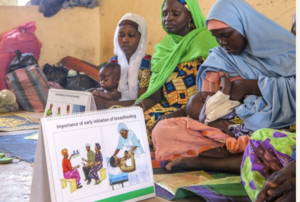How Hunger is Affecting Breast Milk Quality, Quantity; Exclusive Breatfeeding Difficult
How Hunger is Affecting Breast Milk Quality, Quantity; Exclusive Breatfeeding Difficult

Impact of Economic Hardship on Breast Milk Quality and Exclusive Breastfeeding
In a recent interview marking the 2024 World Breastfeeding Week, mothers shared their struggles with maintaining exclusive breastfeeding due to the current economic climate. This awareness campaign, supported by the Bauchi government, international partners, and stakeholders, highlights the challenges faced by new mothers.
Many mothers expressed concerns that the economic downturn is affecting their ability to consume nutrient-rich foods essential for breastfeeding. Nuratu Maigari, a 28-year-old mother of a three-month-old, stated, “I worry that the tradition of exclusive breastfeeding for at least six months may not continue due to the economic hardship. I managed to exclusively breastfeed my other two children, but I’m finding it difficult with this baby.”
Maigari emphasized that a new mother’s diet—rich in meat, poultry, fish, eggs, dairy, beans, and vegetables—is crucial for adequate milk production and maternal energy. “Eating well significantly impacts the quantity and quality of milk,” she noted.
Jamila Usman, another new mother, mentioned that her family’s financial struggles have made it impossible to afford regular meals. “I will have to start introducing water to my baby as I can’t maintain exclusive breastfeeding,” she said.
Asabe Umar, a first-time mother, also voiced her concerns. She was advised during her antenatal care to exclusively breastfeed for the first six months, with continued breastfeeding for up to a year. “My husband is the sole provider, and it’s been tough. I was told to eat a variety of foods to support breastfeeding, but finding money for these foods is a challenge,” Umar explained.
In contrast, Talatu Mahmoud, a new mother, took a proactive approach by planting vegetables using sacks and buckets. “I planted Ugu, bitterleaf, water leaf, moringa, and tomatoes to ensure I have some nutritious food for breastfeeding,” she said.
Abdurrazak Shehu, an officer at the federal low-cost primary health center, reported that educational efforts on nutrition and simple gardening techniques have been implemented during antenatal, postnatal, and immunization days. He noted a slight increase in exclusive breastfeeding rates, with 31 babies exclusively breastfed in June 2024 and 40 in July, indicating that despite economic challenges, many mothers continue to adhere to breastfeeding r
ecommendations.
TRENDING SONGS
 NNPC Boss Ojulari Bags UK Energy Institute Fellowship
NNPC Boss Ojulari Bags UK Energy Institute Fellowship
 Shock in Anambra: Bride Disappears Moments Before Wedding
Shock in Anambra: Bride Disappears Moments Before Wedding
 Nigerian Woman Returns ₦330 Million Accidentally Credited to Her Account
Nigerian Woman Returns ₦330 Million Accidentally Credited to Her Account
 APC Don Reach Morocco?’ VeryDarkMan Reacts to Seyi Tinubu Poster
APC Don Reach Morocco?’ VeryDarkMan Reacts to Seyi Tinubu Poster
 Bride Breaks Down in Tears as Wedding Meals Were Kept Secretly While Guests Go Home Hungry
Bride Breaks Down in Tears as Wedding Meals Were Kept Secretly While Guests Go Home Hungry
 Odogwu by Day, Robber by Night: How Marriage Joy Turned Into Tragedy
Odogwu by Day, Robber by Night: How Marriage Joy Turned Into Tragedy
 Nigerian Officials Allegedly Pocket N4–6B Weekly Through Smuggling Cartels at Seme–Badagry Border
Nigerian Officials Allegedly Pocket N4–6B Weekly Through Smuggling Cartels at Seme–Badagry Border
 Ahmad Yerima: Naval Officer to Face No Sanctions After Clash with Wike – Matawalle
Ahmad Yerima: Naval Officer to Face No Sanctions After Clash with Wike – Matawalle
 Trending Video: Muslim Man Joins Wife in Hallelujah Challenge ‘Dress Like Your Miracle’ Night
Trending Video: Muslim Man Joins Wife in Hallelujah Challenge ‘Dress Like Your Miracle’ Night
 Woman Seeks Advice as Late Brother’s Wife Refuses to Mourn Him Following His Death With Alleged Mistress
Woman Seeks Advice as Late Brother’s Wife Refuses to Mourn Him Following His Death With Alleged Mistress
Share this post with your friends on ![]()













